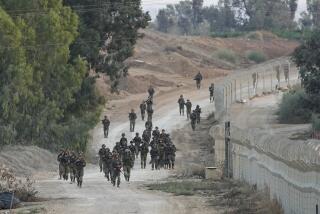Afghan Rebels Poorly Equipped for Jalalabad Siege, Analysts Say
- Share via
ISLAMABAD, Pakistan — Afghan rebels attacking Jalalabad have been hampered by poor coordination, equipment unsuitable for a siege, mine fields and bombing, Western diplomatic analysts said Tuesday.
Commenting on the first two weeks of fighting around the eastern Afghan city, the analysts said there is no indication that Jalalabad will be taken soon.
The Western-backed moujahedeen guerrillas need to coordinate pressure on Jalalabad from all sides and cut it off from Kabul, the Afghan capital, by air and road, the analysts said.
Jalalabad airport, focus of the last two weeks’ fighting, has been closed to fixed-wing aircraft since the battle began, the rebels say.
The Western analysts said the initial attack was badly organized. The guerrillas did not have enough time to involve local tribal elders or make proper attempts to win over commanders of military units in the besieged garrison.
After the unexpectedly quick capture of a government stronghold at Samarkhel, the attackers pushed on impetuously to the airport where the offensive was halted, the rebels say.
The Western diplomats said the moujahedeen equipment is more suited for guerrilla warfare than a siege. The rebels’ rockets are largely ineffective against entrenched defenders.
The moujahedeen are still confident of victory, while President Najibullah’s government says the rebel advance has been halted with heavy guerrilla casualties. It accuses Pakistani troops of assisting the rebels. Pakistan denies that its troops are in Afghanistan.
In Kabul, Najibullah, in a speech ushering in the Afghan new year, urged the United Nations to set up monitoring posts on the Pakistani border to halt the rebel offensive.
The Afghan leader addressed his nation in a speech broadcast late Monday night as the guerrillas based in Pakistan pressed their two-week-old siege of Jalalabad.
Najibullah noted that the United Nations established checkpoints along the Soviet border to monitor the departure of Soviet soldiers, who completed their withdrawal from Afghanistan on Feb. 15, and he said the same should be done along the Pakistani border.
The Afghan year 1368, which follows an Islamic calendar different from that of most Muslim nations, began Tuesday with a bleakness caused by both weather and the weariness of war.
Although there were big turnouts at major Kabul mosques, there was little sign of celebration. A drizzle turned the streets to mud and kept most people indoors.
ANOTHER CASUALTY The Afghan rebel drive to capture the key city of Jalalabad has left hundreds dead.
Fighting has also severed Kabul-Peshawar route used by smugglers to transport Soviet goods, which meant money for border tribes that back rebels.
More to Read
Sign up for Essential California
The most important California stories and recommendations in your inbox every morning.
You may occasionally receive promotional content from the Los Angeles Times.













